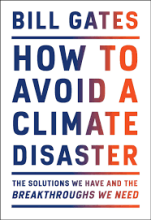How we get around
22 important questions on How we get around
Bill Gates asks two questions, what are the right answers?
- 1. Which of these contains the most energy?
- A. A gallon of gasoline
- A stick of dynamite
- C. A hand grenade
- 2. Which of these is the cheapest in the U.S?
- A. A gallon of milk
- A. A gallon of orange juice
- C. A gallon of gasoline
- A. A gallon of gasoline
- A stick of dynamite
- C. A hand grenade
- A. A gallon of milk
- A. A gallon of orange juice
- C. A gallon of gasoline
- The right answers are A and C: gasoline. This means that gas contains a lot of energy, but is also very cheap: it packs a punch, and it's cheap.
How much does transport contribute to global emissions?
- 16%, ranking fourth behind how we make things, plug in, and grow things. We produce 8.2 billion tons of carbon from transportation.
According to The Organization for Economic Cooperation and Development, we don't just need to eliminate the 8.2 billion tons of carbon we produce today from transportation, but we'll need to get rid of even more, why do they say that?
- Because The Organization for Economic Cooperation and Development predicts that demand for transportation will keep growing through at least 2050.
- Higher grades + faster learning
- Never study anything twice
- 100% sure, 100% understanding
According to Bill Gates, the fact that more people and goods are moving around, three have advantages, which three are those?
- 1) The ability to travel is a form of personal freedom and a survival for farmers in poor countries who need to get their crops to market.
- 2) Because of international flights the world is being able to meet people from other countries to help us understand our common goals
- 3) We can eat food from all over the world, not just food from your own country.
Can you appoint the percentage of emissions that comes from different vehicles?
- Cars, SUVs, and motorcycles; 47%
- Garbage trucks, buses, and 18-wheelers: 30%
- Cargo and cruise ships: 10%
- Airplanes: 10%
- Other: 3%
How many passenger cars were there in 2018 around the world?
- 24 million passenger cars
What is, according to Bill Gates, the reason we need an alternative for passanger cars and which alternatives does he propose?
- Because burning gasoline inevitably releases greenhouse gases, we need an alternative; either fuels made from carbon that's already in the air rather than the carbon that's in fossil fuels, or some other form of energy altogether.
The first alternative that Bill Gates propose to get rid of the emissions by passenger cars, are electric cars, what are the advantages and disadvantages of this?
- It's an alternative that has already been proven to work, cars that use it are being sold by brands like, Audi, Fiat, Volkswagen etc;
- They are far more expensive than gasburning counterparts;
The second alternative that Bill Gates propose to get rid of the emissions by passenger cars, is to switch to alternative liquid fuels that use carbon that was already in the atmosphere, what is the advantage of this?
- When you burn this fuels, you're not adding extra carbon to the air; you're returning the same carbon to where it was when the fuel was made.
The third alternative that Bill Gates propose to get rid of the emissions by passenger cars, is use "alternative fuels", like ethanol, what is ethanol?
- It's a biofuel that's usually made from corn, sugarcane, or beet sugar.
What is, according to Bill Gates, a problem about using ethanol as a alternative fuel to get of the emissions by passenger cars?
- Corn-based ethanol isn't zero carbon, and depending on how it's made, it may not even be low carbon, because frowing the crops requires fertilizer and the refining process, produces emissions too.
What are, according to Bill Gates, the five advantages of alternative fuels to get rid of the emissions by passenger cars?
- 1) They can be made from plants that aren't growing for food or from farming residue, by-products left over from making paper, and even food and yard waste;
- 2) baucase they're not food crops, they need little or no fertilizer;
- 3) They don't need farmland that could otherwise be dedicated to food;
- 4) You can use them in a conventional engine without modifying it;
- 5) We can transport them using tankers, pipelines, and other infrastructure we've already spent billions to build and maintain;
How can you create alternative fuels?
- Biofuels get their energy from plants;
- We can use zero-carbon electricity to combine the hydrogen in water with the carbon in carbon dioxide, resulting in hydrocarbon fuels;
What is a advantage and disadvantages about electrofuels?
- An advantage is because they're made using carbon dioxide captured from the atmosphere, burning them doesn't add to overal emissions;
- The disadvantages is that they're very expensive, because you need hydrogen to make them and it costs a lot to make hydrogen without emitting carbon;
How much spends a household in the U.S on gasoline per year?
- Around $2,000 a year
According to Bill Gates, the bigger the vehicle you want to move, and the father you want to drive it without recharging, the harder it'll be to use electricity to power your engine, why is that?
- This is because batteries are heavy, they can store only a limited amount of energy and they can deliver only a certain amount of that energy to engine at one time
Can you explain why we can't electrify our cargo trucks?
- Because they are too heavy, so you'll need to carry many more batteries, which isn't very practical: you need 35 times more batteries by weight to get the same energy as fuel.
Because we can't electrify our cargo trucks, our only solutions are electrofuels and advanced biofuels, what can you say about the Green Premiums?
- According to Bill Gates, they have dramatic Green Premiums.
- As an example = if you take a Diesel with the retail price per gallon of $2,71, you have the next Green Premium:
- For advanced biofuels you have a zero-carbon per gallon of $5.50 with a Green Premium of 103%
- For electrofuels you have a zero-carbon per gallon of $9.05 and a Green Premium of 234%.
According to Bill Gates, our best option is to replace jet fuel with electrofuels and advanced biofuels, what can you say about the Green Premiums that come with them?
- For advanced biofuels with a zero-carbon per gallon of $5.35 you have a Green premium of 141%
- For electrofuels with a zero-carbon per gallon of $8.80 you have a Green Premium of 296%.
According to Bill Gates, what can you say about the Green Premiums if you replace bunkel fuel with zero-carbon alternatives?
- If you have a retail price per gallon of $1.29 of bunkel fuel, you have the next Green Premiums:
- For advanced biofuels with a zero-carbon per gallon of $5.50, you have a Green Premium of 326%.
- For electrofuels with zero-carbon per gallon of $9.05, you have a Green premium of 601%.
According to Bill Gates, there are four ways to cut down on emissions from transportation, which four are they?
- 1. To do less of it: less driving, flying, and shipping.
- 2. To use fewer carbonintensive materials
- 3. To use fuels more efficiently, but the standards from economies don't go far enough and they don't get us to zero.
- For example, there are suggested emissions standards for international shipping and aviation, but they're almost unenforceable.
- 4. This is the most effective way we can move toward zero emissions from transportation: switching to electric vehicles and alternative fuels.
According to Bill Gates, to make more people use electric cars, we'll need some inventive government policies, why is that?
- We can speed up the transition by adopting policies that encourage people to buy electric cars and creating a network of charging stations so they're more practical to own.
- Nationwide commitments can help drive up the supply of cars and drive down their cost
- For example, California has committed to buying only electric buses by 2029 and to banning the sale of gas-powered by 2035.
The question on the page originate from the summary of the following study material:
- A unique study and practice tool
- Never study anything twice again
- Get the grades you hope for
- 100% sure, 100% understanding
































